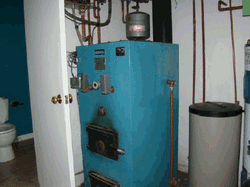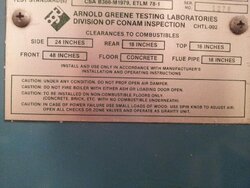Hello,
We are staring down a big snow starting tomorrow and I have a question about using my boiler with the power out.
I have a 2200 sf 2 story house, 4 zones, burnham wood fire boiler with 2 circulator pumps. housed in my garage attached to the house. I believe closed loop. Well water. I can give me info if needed.
My question is on the front of my boiler it says I can operate the boiler without power by using it as a gravity feed system by opening all of the reliefs. Thats all it says and I'm not really sure what that means. It was in the house when we bought it and I'm still learning. It is the only heat source but does have an electrical backup that uses heating coils like a hot water heater. In the event of a power outage I couldnt use those because they would pull too much for my generator and I can't figure out how to run just my pumps with the generator so I can use wood. Is there a way to run the system without power? I searched and read about a battery backup but I'm in a pinch with the weather coming tomorrow. Should have prepared sooner.
Thanks in advance. This is the only picture I have of my boiler at the moment. that door goes directly into the house
We are staring down a big snow starting tomorrow and I have a question about using my boiler with the power out.
I have a 2200 sf 2 story house, 4 zones, burnham wood fire boiler with 2 circulator pumps. housed in my garage attached to the house. I believe closed loop. Well water. I can give me info if needed.
My question is on the front of my boiler it says I can operate the boiler without power by using it as a gravity feed system by opening all of the reliefs. Thats all it says and I'm not really sure what that means. It was in the house when we bought it and I'm still learning. It is the only heat source but does have an electrical backup that uses heating coils like a hot water heater. In the event of a power outage I couldnt use those because they would pull too much for my generator and I can't figure out how to run just my pumps with the generator so I can use wood. Is there a way to run the system without power? I searched and read about a battery backup but I'm in a pinch with the weather coming tomorrow. Should have prepared sooner.
Thanks in advance. This is the only picture I have of my boiler at the moment. that door goes directly into the house



